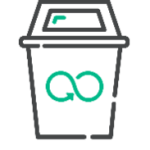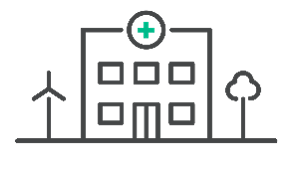Energy & Water

| What we’ve done so far | What we planned to do in 2022/23 | What we achieved |
| Set a roadmap to Net Zero by 2040 Developed carbon budgets for energy related carbon emissions Selected as a partner for Modern Energy Partners Programme (see case studies) Completed strategic heat audit of Freeman Hospital to reduce carbon emissions and support a shift to low carbon sources of energy Completed hydrogen study of RVI a part of region wide strategic decarbonisation work LED lighting rollout Improvements to heating systems and building controls Electrical capacity review for the RVI to assess requirements for infrastructure investment to enable electrification of heat All grid electricity supplies moved into one 100% renewable portfolio Secured £145,000 from Low Carbon Skills Fund and have developed Heat Decarbonisation Plans Carried out feasibility studies for the journey to a Net Zero Carbon estate Automatic loggers installed on most water meters | Share learning from Low Carbon Skills Fund studies to inform energy decarbonisation plans Submit application for the Public Sector Decarbonisation Scheme (PSDS) Link up energy & engineering requirements for data Link the Net Zero Carbon & Back Log Maintenance priorities Continue ongoing energy efficiency improvements (e.g. LED lighting, Building Management System improvements) Continue work to ensure new builds and refurbishments are net zero carbon in operation | Submitted an application to the Public Sector Decarbonisation Scheme (PSDS) for air source heat pumps, LED lighting, solar panels and improved metering for Regent Point. Commissioned survey of utilities metering, with aim of agreeing a metering strategy. Supported the City Low Carbon Heat Network feasibility study, led by Newcastle City Council. Carried out Net Zero briefings for Estates staff and begun engagement work with senior Estates management. |
Waste

| What we’ve done so far | What we planned to do in 2022/23 | What we achieved |
| Implemented a new auditing process to maintain strong waste segregation routines and waste hierarchy movement Introduced new waste training videos for staff Developed a new cannulation pack for Oncology to reduce waste, standardise practice and improve IV related infection rates Avoided waste by making decision to use reusable lab coats in new, large regional COVID testing lab Installed food waste de-waterer in the RVI catering department; this food waste is then sent to anaerobic digester to produce biogas for grid and slurry for local farmland Introduced large metal recycling boxes into theatres Completed an EU project looking at reducing plastic use in healthcare Commenced roll out of 300 additional recycling bins | Reduce the overall amount of waste disposed of by Investigating technological opportunities and alternative solutions for reducing waste Investigating key product categories of single use plastic using data from Supplies & NHS Supply Chain, to reduce consumption Collaborating with the ICS Waste Management Group on proposals for a regional furniture re-use system Staff training and understanding will also be improved by: Embedding the Healthcare Waste Management Guide into local inductions Developing additional waste training and promoted to staff A continual focus is to look at opportunities to move waste up the waste hierarchy, to reduce the impact of the waste we do produce. We are particularly focusing on reducing waste sent for clinical waste incineration, e.g. establishing Needlesmart and exploring opportunities for wider roll-out (currently only utilised in vaccine centre). | Investigated innovative technologies for sharps disposal, and assessed potential for adoption Linked waste and resource use in to the Food and Nutrition strategy, with an aim to reduce food waste and increase recycling Increased engagement across the hospitals by running a ‘Waste Awareness Week’ programme of trust-wide communications Carried out a number of duty of care visits to key waste contractors to ensure waste is being managed in line with the waste hierarchy Engaged with the network of Green Champions Plus to accelerate adoption of reusables and reduction in single-use plastics, with the aim of implementing new Trust-wide practices Carried out waste audits of wards and departments to ensure good standards of waste segregation are maintained, and provide an opportunity for discussion and engagement. |
Buildings & Land

| What we’ve done so far | What we planned to do in 2022/23 | What we achieved |
| Explored options for living wall facades Completed a Biodiversity Action Plan for Freeman and RVI and locations have been identified for development into biodiverse areas Planted 100 trees across our sites Recognised that new build projects are as close to Net Zero Carbon in operation as possible Renewed Grounds Maintenance contract includes 10 principles to support biodiversity on site | Areas have been identified for our ‘Green the Grey’ project. This will turn some of our courtyards and outside spaces into biodiverse areas with plants and seating. Review the biodiversity metric every year with a view to increasing the score across sites Include climate resilience and adaptation in our green spaces Work with Newcastle Hospital Charities team on joint initiatives | Appointed a resource to implement the actions defined in the Biodiversity Action Plan and the Green the Grey programme. Included 10 principles to support Biodiversity within the grounds maintenance contract Employed a Nature Recovery Ranger who is working to improve the biodiversity of outside spaces and increase the accessibility for staff and patients. Funding approved to create a garden at the Great North Children’s Hospital – a place to play and grow. |
Journeys

| What we’ve done so far | What we planned to do in 2022/23 | What we achieved |
| Continued to electrify our fleet of vehicles Published aspiration to become a Clean Air Hospital – rated excellent on the Clean Air Hospital Framework Business Lease Car Scheme set up to encourage staff to apply for a new hybrid or electric vehicle for business journeys Staff benefits scheme has EV available at competitive rates making them a realistic option for staff Commenced trials of e-bikes for community staff Invested in new EV charging points Worked with Newcastle City Council to improve the dedicated cycling infrastructure to access the RVI site Increased secure cycle parking available ZMOVE cycle couriers support local zero emissions delivery • Installed Air Quality Monitoring kit on site at the RVI • Introduced a no idling policy • Working in partnership with North East and North Cumbria Integrated Care System (NENC ICS), Global Action Plan (GAP) and Boehringer Ingelheim (BI) to develop an ICS Clean Air Framework | Ensure 90% of our fleet and pool vehicles are fully electric Improve our rating on the Clean Air Hospital Framework Continue to work in partnership with GAP and BI to implement a NENC ICS Clean Air Framework Improve communications for service users and visitors on how to travel to work Introduce more opportunities for staff to access pool bikes for business travel | Worked with Boehringer Ingelheim and Global Action Plan on the development of a ICS Clean Air Framework Recruited a PhD Student to research Sustainable Approaches to Reducing Air Pollution and Carbon Emissions in Urban Hospital Environments Installed air quality monitoring kit at the Royal Victoria Infirmary |
Procurement

| What we’ve done so far | What we planned to do in 2022/23 | What we achieved |
| A sustainable procurement working group is established Commenced a NHS sustainability Partnership Award winning supplier engagement programme (more information on this page) and engaged and supported suppliers with climate emergency action Began to implement the new Silver Food for Life Standard ‘Sustainable Food for All’ is now one of the three strands of the five-year Food and Drink Strategy Continued Meat Free Mondays in Trust catering outlets Taken steps to improve data on the carbon in our ‘Newcastle Hospitals Carbon Footprint Plus’ | Continue to improve carbon literacy and sustainable procurement awareness in the procurement team Introduce a requirement for key suppliers to commit to take action on the climate emergency Review and update the Sustainable Procurement Policy Work with key suppliers to innovate on decarbonising our supply chain Improve confidence in our supply chain carbon data by beginning to collect carbon footprint data direct from our suppliers Achieve a silver food for life award for in house catering | Members of the Supplies & Procurement departments have completed sustainability training and are working to build central mandates on social value into procurement processes. First acute trust in the country to achieve CIPS (Chartered Institute of Procurement & Supply) Ethical Procurement Mark. Developed an award winning five-step programme to proactively engage and support all suppliers to calculate and report their carbon footprints – enabling us to improve the accuracy of our supply chain carbon footprint. To date 22% of our supplier base is engaged on the programme. |
Models of Care

| What we’ve done so far | What we planned to do in 2022/23 | What we achieved |
| Appointed a Fellow in Environmentally Sustainable Anaesthesia Continued reduction in the carbon footprint from anaesthetic gases through reduced use of desflurane, and its removal from Freeman Hospital Multi-disciplinary Sustainable Respiratory Care working group established to progress action to reduce the carbon footprint related to inhaler use Carbon footprint of the renal care pathway calculated by Sustainable Healthcare Coalition in partnership with our clinicians Links made with the Newcastle Improvement Faculty to embed sustainability in the Quality Improvement (QI) process Developed a Sustainability in QI toolkit for staff Trialled nitrous oxide capture and cracking technology in Women’s Services. The first baby born in the UK where this technology was used was at the RVI Carried out the world’s first carbon neutral cataract surgery Multidisciplinary team undertook a revision of the North of Tyne, Gateshead and North Cumbria inhaler formulary, to reduce pMDI and increase DPI prescribing. DPIs are now first choice in each class. | Continue trial of anaesthetic gas capture and cracking technology in Women’s Services and introduce into new areas Look to further reduce the carbon footprint from anaesthetic gases through reduction of leaks in the system and further reducing the use of Desflurane as examples Focus sustainable respiratory care action on improved inhaler technique through communications and training Further embed sustainability into Newcastle Improvement and QI | 3 month trial of anaesthetic gas capture and destruction initiated. Incorporated sustainability metrics into Newcastle Improvement methodology Approved a Climate Emergency Action Fund project to trial volatile anaesthetic gas capture technology at five operating theatres at the Freeman Hospital Appointed two charity funded Sustainability Fellows – one in Children’s Medicine, and one in Adult Oncology Worked with Centre for Sustainable Healthcare to embed sustainability into Newcastle Improvement training and support. Initiated an Eco Ward project led by a Sustainability Fellow, to embed sustainability throughout the activities of Ward 2a. Initial stages of a large improvement project, bringing together stakeholders from nursing and pharmacy to address medicines waste. |
People

| What we’ve done so far | What we planned to do in 2022/23 | What we achieved |
| Developed a range of tools and resources to enable our people to get support Sustainable Healthcare in Newcastle (Shine) – see page for more information Trained 17 Sustainability Ambassadors through our IEMA approved course Added a Climate Emergency for Managers course to our training options Made a £50,000 Climate Emergency Action Fund available to staff to enable them to kick-start sustainability projects Sustainability and climate action is now included in job descriptions and person specifications Launched the Shine Rewards engagement app, recording over 50,000 sustainable actions taken by our staff Created a Shine Award for staff led projects Expanded the Green Champions network to over 300 members Introduced the Green Champions Plus role as a new role for staff who want to drive forward change in their areas Created a ‘What Good Looks Like’ Model for Sustainability to enable directorates and departments to visualise how they can embed sustainability into their culture and operations Established a 10-step plan for directorates to measure progress on our breakthrough objective to embed sustainability into our culture, and supported 7 departments to start this process Carried out board development on Climate & Health | Continue to implement the training programme and increase the number of Sustainability Ambassadors and trained managers Increase the number of Green Champions and Green Champions Plus | Delivered two cohorts of Sustainability Ambassadors training, and bimonthly Climate Emergency for Managers training, increasing awareness and understanding of the Climate Emergency and what staff can do to support the programme at any level Developed a group of Green Champions Plus – empowered to spend time on sustainability, attend meetings, share progress and support each other to increase the impact of their successes. Published the Red Flag Edition of the Annual Shine Report, highlighting our increasing carbon footprint and re-stating the urgency with which transformational action is required. Delivered a session to Trust Management Group following the completion of the Annual Shine Report – Red Flag Edition Developed a 10-step framework for Directorates to implement to embed sustainability and supported resulting directorates’ Sustainability Working Groups. Began to improve patient and service user engagement starting with the Youth Forum. |
